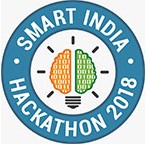Location:
Indian Institute of Science

Smart India Hackathon 2018 – Agenda
Indian Institute of Science (IISc) Bengaluru, the highest ranked educational institution in the country, is all set to host the Grand Finale of the ‘Smart Vehicles’ theme of the Smart India Hackathon 2018 (SIH2018) – Hardware edition, from June 18-22, 2018. The hackathon, organized by the Ministry of HRD along with AICTE, Persistent Systems, i4C, IIT Kharagpur and Rambhau Mhalgi Prabodhini, is a first-of-its-kind innovative methodology adopted in India, which will provide an opportunity for young technical minds to showcase their creativity in the form of hardware products that can solve some of the daunting problems faced by India, such as clean water, waste management, creation of smart vehicles and smart communication. The Hardware edition is the second sub edition of SIH2018; the first sub edition or the Software edition Grand Finale successfully took place on March 30 & 31, 2018, at 28 nodal centers across India.
IISc is the nodal center for the ‘Smart Vehicles’ theme of this 5 day-long hardware hackathon. The 10 themes of the Hackathon Grand Finale are organized at 10 prestigious institutions (nodal centers) across India: IIT Kanpur (Drones), IIT Kharagpur (Agriculture), IIT Guwahati (Rural Technology), CEERI Pilani (Smart Communication), CSIO Chandigarh (Healthcare), IISc Bengaluru (Smart Vehicles), IIT Roorkee (Clean water), NIT Trichy (Waste Management), COEP Pune (Security), and Forge Coimbatore (Import Substitution).
Under the Hardware edition, 4362 ideas were received, with over 50000 students participating from over 752 technical institutions. After two internal rounds of evaluation, a total of 106 teams have been shortlisted to compete under the above 10 themes in the SIH2018 Hardware edition Grand Finale.
The event at IISc is a cooperative effort involving faculty members, students, and admin staff. The faculty team comprises Professor Joy Kuri, Professor Amaresh Chakrabarti, Dr. TV Prabhakar, Dr. Rathna, Dr. Manish Arora, and Professor Y Narahari, Chair of Division of Electrical, Electronic and Computer Sciences, IISc, as well as other faculty members across departments who serve on the Jury, and over forty student and staff volunteers from IISc, including Student Coordinators Siddharth Nair and Kinshuk Khare, and Staff Coordinator Mr. Shankar. True to the interdisciplinary nature of the theme, the activities of the event are distributed across five departments of IISc: Electronic Systems Engineering (DESE), Centre for Product Design and Manufacturing (CPDM), Electrical Engineering (EE), Computer Science and Automation (CSA), and the Supercomputer Education and Research Centre (SERC). The testing and field demonstration of prototypes will be organised at the Gymkhana ground, IISc.
The Grand Finale at IISc will be inaugurated during 0800-1000 hours at the SERC Auditorium of IISc. Professor Anurag Kumar, Director, IISc, will preside over the event, where Shri Prakash Javadekar, Honourable Minister of HRD; Professor Anil Sahasrabudhe, Chair, AICTE; Professor Partha Pratim Chakraborty, Director IIT Kharagpur; and Shri R. Subrahmanyam, Secretary, MHRD, will join via video conference. The event will be organized round-the-clock for the whole week, where 12 finalist teams from around the country will be mentored and supported in developing and testing their prototypes to take it to the next level. Their progress will be reviewed by an elite group of academics, industrialists, entrepreneurs and investors. The Grand Finale will include 3 judging rounds and an additional power judging round where top teams will be judged by industry experts and angel investors. On the final day, June 22, the Jury will announce the winners.
The projects competing in the event include a self-driving kit for converting conventional cars into their electric avatars; an anti-theft and health monitoring system for bikes and their riders; a safe distance alarming system for vehicles; a real-time traffic management system based on air pollution monitoring using IOT; a 2-wheeler license automation system; an anti-pilferage and anti-adulteration system for fuel road tankers, and so on.


